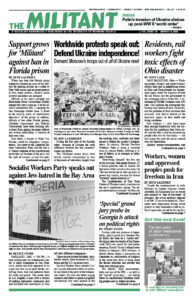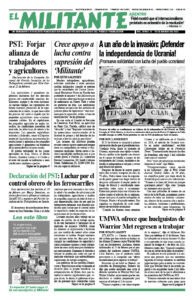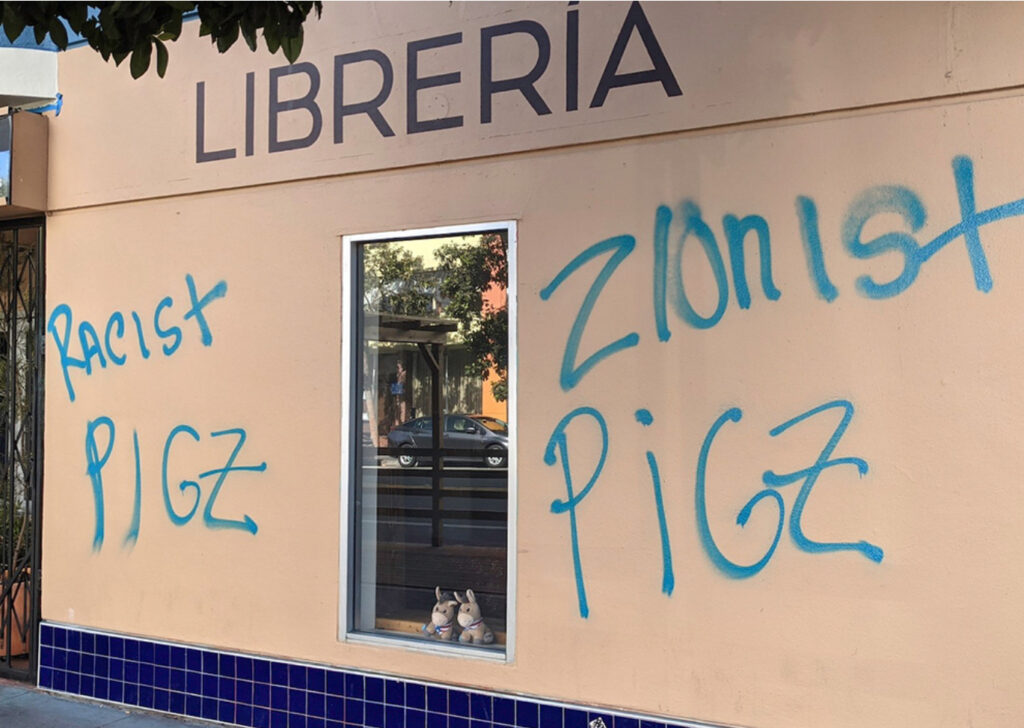OAKLAND, Calif. — On Feb. 1 a man walked into the Schneerson Center, a small synagogue in San Francisco, pulled out what appeared to be a gun and shot six or eight blanks, terrifying those who had gathered there for study and prayer. Two weeks later in Los Angeles a man with a history of making antisemitic statements shot and wounded two worshipers as they left their different synagogues.
These are not isolated incidents. Anti-Jewish attacks have increased in California and the U.S. in recent years.
Socialist Workers Party member Carole Lesnick delivered a letter of solidarity on behalf of the party to the Schneerson Center. She also sent letters urging unionists and others to speak out against antisemitism that were printed in the East Bay Times, Mercury News/San Jose, Jewish News of Northern California and San Leandro Times.
“Working people in this country face a grinding economic crisis,” Lesnick wrote. “History teaches us that as this crisis deepens, and as workers fight back, the capitalist rulers will turn to Jew-hatred, seeking to blame Jewish people for the economic and social problems workers face.”
Party members have also reached out to Jewish students at the University of California at Berkeley who are being targeted, not by ultrarightists, but by liberals and students who consider themselves part of the left.
As many as 14 clubs at its law school, including Women of Berkeley Law, the Queer Caucus and Law Students of African Descent, have put into their bylaws a ban on speakers holding views “in support of Zionism, the apartheid state of Israel, and the occupation of Palestine.” Since over 80% of Jews believe Israel has a right to exist, it’s a ban on Jews. A ban not on speaking about Israel, but on any topic.
Last August the five-member board of the Jewish Students Association at Berkeley Law issued a response, saying that “students should not be forced to choose between identifying as either ‘pro-Palestine’ and thereby ‘anti-Israel’ or ‘pro-Israel’ and thereby ‘anti-Palestine.’ Students can advocate for Palestinians and criticize Israeli policies without denying Israel the right to exist.”
Association board member Charlotte Aaron told a meeting sponsored by the Jewish Community Relations Council in October that clubs imposing the ban require members to attend a training session. Its message? “If you are a Zionist, in any way, shape or form, then you are also a settler colonialist, and you support police brutality, and all sorts of really terrible things.”
Socialist Workers Party members spoke with U.C. Berkeley student Ariel Mizrahi, who was tabling on the campus plaza with “Bears for Israel,” named after the school’s mascot. Her family fled to Israel from Egypt when Jews were being expelled from Arab countries as Israel was formed after the Holocaust of World War II. “The life of my family was at stake,” she said. “The years of oppression of Jews is why Israel is needed.”
The organization JewBelong put up billboards in the neighborhoods around the Berkeley campus stating, “You don’t have to go to law school to know that anti-Zionism is Anti-Semitism.” Opposing groups vandalized the billboards, writing “Anti-Zionism = Anti-Racism.”
Speakout against antisemitism
At a Feb. 18 Militant Labor Forum speakout against antisemitism, Lesnick said the meaning of the word Zionism has evolved over time. Before the Holocaust, a majority of Jews rejected the Zionist movement’s dream of a homeland for Jews in Palestine as a solution to Jew-hatred and violence. “This changed when the U.S., Canada and other imperialist powers slammed their doors on refugees fleeing fascism, when Jewish survivors of Nazi extermination had no choice but to go to Palestine for survival.
“Israel has existed for over 70 years. There is nothing like the old Zionist movement today,” Lesnick said. Many who identify as Zionists just mean they support the existence of Israel. “For antisemites, the term ‘Zionists’ has become a synonym for ‘Jew.’”
The SWP supports the fight of Palestinians for their rights and against national oppression, including support for a sovereign contiguous Palestinian state, Lesnick said.
The view that Israel exists as nothing more than a colonial-settler occupation, the same as apartheid South Africa, alongside calls for all of Israel, from the Jordan River to the Mediterranean Sea, to become Palestine — a call for the destruction of Israel — are harmful to both Palestinians and Jews, she said. It denies the need for Israel as a refuge for Jews fleeing antisemitic attacks and blocks any solution, feeding an unending cycle of violence and war.
“Israel is a capitalist, class-divided state. We do not support the Israeli government or its policies, domestic and foreign,” Lesnick said. “This government, like the neighboring Arab governments, is anti-working-class. The freedom of all working people in the area, Jews, Palestinians, Kurds, Druze, Muslims and Christians, can only be won in defense of common class interests.”
It will take socialist revolutions bringing an end to capitalist exploitation and oppression to end the threat of antisemitism, she said. “We should look to the example of Cuba, the only country where Jews do not face discrimination or the threat of violence.
“As the world crisis of capitalism deepens, the rise of fascist movements is inevitable,” she said. When antisemitic fascist gangs began to grow in the U.S. in the late 1930s they targeted the unions. A successful fightback was led by the Teamsters union in Minneapolis. “The most important thing we can do today is strengthen the union movement, raise the need for a labor party, based on the unions, that can fight for a workers and farmers government.”
Lesnick warned against bans on freedom of speech as these questions are fought out. We should oppose piling charges of “hate crime” on top of charges of violence against those who attack Jews and synagogues, she said. Criminalization by the government of thoughts, including “hate,” is a precedent that will inevitably be used against the working class.
We should oppose the defacing of billboards, whether you agree with them or not, she said. The “cancel culture” growing on campuses needs to be fought. When, as at the U.C. Berkeley campus, there are different positions about Israel and Palestine, the opposite of trying to silence opposing views must be enforced, so they can be discussed and debated out.


